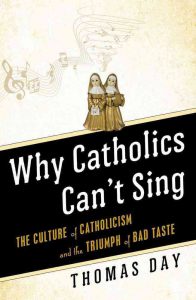Let’s contrast two people. John’s an adult who came back to Mass a year ago. After years of being away, at his first Mass, he felt at home, like he belonged. Since then, Mass has been interesting to him, he’s started finding answers to his questions, the teachings of the Church are making more sense, and, most importantly, he’s felt loved by God. He notices that he’s a better person, is happier with the way his life is going, he’s praying every day, and has joined different ministries in the church.
Johnny’s different: He’s a teenager and slowly finds Mass more and more boring. In his own words, He “used to be closer to God,” used to altar serve, and at one point loved youth ministry. He hasn’t been to Confession in a while and spiritually nothing makes sense to him. The few times he’s thought about this decrease in his faith, he doesn’t know what’s happened; he only notices how much things have changed.
John will continue to grow spiritually, while Johnny will eventually stop going to Mass; statistically speaking, he probably won’t return.
These two characters are conglomerates of people I’ve met over the years and embody typical spiritual patterns of growth and decline. Many of us may follow similar patterns in our faith. Even priests fit into these categories: our faith can be quite dynamic or slowly dying.
The key point we want to focus on today is why: Why is John growing so quickly while Johnny’s faith is fading? Both go to the same Mass, but have different experiences of it. Why does almost everything spiritual make sense to John, but nothing makes sense to Johnny? (And by the way, John is much older, has had a harder life, and asks more difficult questions, but still finds answers.)
In answering these questions, the first point to make is that it’s not a problem with God, because God loves both men, and “desires all men to be saved and to come to the knowledge of the truth” (1 Tm 2:4). The real reason why there’s a difference between the two men has to do with their openness to God.
 In the Gospel we just heard, Jesus says, “To those who have, more will be given, and they will have an abundance; but from those who have nothing, even what they have will be taken away” (Mt 13:12). In other words, to those who are responsive and open to God, they receive everything God wants to give them; but to those who are always closed to God, they lose every spiritual gift. St. John Chrysostom says that when we have “zeal and eagerness” we receive everything we need from God. But when we’re unresponsive, we can’t receive anything (Ancient Christian Commentary on Scripture, Matthew 1-13).
In the Gospel we just heard, Jesus says, “To those who have, more will be given, and they will have an abundance; but from those who have nothing, even what they have will be taken away” (Mt 13:12). In other words, to those who are responsive and open to God, they receive everything God wants to give them; but to those who are always closed to God, they lose every spiritual gift. St. John Chrysostom says that when we have “zeal and eagerness” we receive everything we need from God. But when we’re unresponsive, we can’t receive anything (Ancient Christian Commentary on Scripture, Matthew 1-13).
For John, everything’s falling into place because he’s open. He comes to Mass with an open heart and learns what he can. He still has tons of questions and not everything makes sense, but he wants to understand, wants to hear why the Church teaches what she teaches.
 But Johnny’s closed… and negative. Why do I say that? Because, no matter what happens at Mass, he can’t find anything good in it. I remember what my superior in Rome said: Some people are “incontentabili,” which literally means ‘unhappiable,’ that is to say, nothing will please them. So, when Johnny’s parents ask him, “How was Mass?” he says, “Boring.” “Did you get anything out of the homily?” “No.” “What about the music?” “No.” “Don’t you think the church is beautiful?” “No.” (We’d almost want to ask him, “Why are you so negative?”) His inability to recognize anything good betrays the underlying issue: He can’t see anything good because he doesn’t want to see it. It’s not that there isn’t anything, but that he refuses to acknowledge it.
But Johnny’s closed… and negative. Why do I say that? Because, no matter what happens at Mass, he can’t find anything good in it. I remember what my superior in Rome said: Some people are “incontentabili,” which literally means ‘unhappiable,’ that is to say, nothing will please them. So, when Johnny’s parents ask him, “How was Mass?” he says, “Boring.” “Did you get anything out of the homily?” “No.” “What about the music?” “No.” “Don’t you think the church is beautiful?” “No.” (We’d almost want to ask him, “Why are you so negative?”) His inability to recognize anything good betrays the underlying issue: He can’t see anything good because he doesn’t want to see it. It’s not that there isn’t anything, but that he refuses to acknowledge it.
All of us have experienced something like this. I remember one time being mad at one of the monks at the seminary. He would always make a joke during class that the other guys found funny, but which I thought was mean and really irritating. And so, during class I would be mad at him. It showed in my body language: I would slouch, not raise my hand, and my face would be unresponsive; I had zero interest in what he was saying, even if it were true, because I couldn’t stand him. Ever had this experience with some priest, boss or family member? Something they do rubs us the wrong way and it taints our view of them.
Now Jesus says, “Let anyone with ears listen!” (Mt 13:9). The characteristic we should have is an attentive listening to truth, an openness to the truth, no matter where it comes from.
One of my teachers, Fr. Joseph Lienhard, SJ, who taught me in New York, observed that Pope Benedict always listened to everyone, even people he disagreed with, and would look for the truth in what they said while rejecting the errors or correcting them.
 His attitude inspired me to try to learn from everyone. For instance, as a Catholic priest, I’m more than happy to learn from Protestants. Why? Because a lot of what they teach… is true. There’s a book (Next Generation Leader) written by Andy Stanley, a famous Protestant pastor, on leadership in the church, that has changed my life. Does this mean we should accept everything anyone says or be uncritical in our thinking? No. While I learn from Protestants, I will always be Catholic because the Church was founded by Jesus and has the fullness of the means of salvation (CCC 824, 830). But, let’s be honest, many Protestant pastors run churches better than we do, and I have a lot to learn from them.
His attitude inspired me to try to learn from everyone. For instance, as a Catholic priest, I’m more than happy to learn from Protestants. Why? Because a lot of what they teach… is true. There’s a book (Next Generation Leader) written by Andy Stanley, a famous Protestant pastor, on leadership in the church, that has changed my life. Does this mean we should accept everything anyone says or be uncritical in our thinking? No. While I learn from Protestants, I will always be Catholic because the Church was founded by Jesus and has the fullness of the means of salvation (CCC 824, 830). But, let’s be honest, many Protestant pastors run churches better than we do, and I have a lot to learn from them.
Now, if we’re open to learning truths from human beings who make mistakes, how much more should we be open to God, who is truth itself.
Over the years, I’ve met hundreds of non-Catholics who come to our churches. Typically, they’re married to a Catholic and so come with their spouse and kids. Now they have a very different attitude than Johnny: They’re open to learning and see goodness in the Mass and very often learn something. Do they agree with everything? No. But they’re open to goodness, and so, they grow spiritually.
So how do we move from being closed to being open? It might be helpful to ask ourselves why we’re closed. Are we angry? Why? Some possible reasons are: Some of us may have felt forced by our parents to go to Mass and so transfer this resentment on Jesus; some of us have been offended by priests, like I was; some are mad at the Church because they had Sr. Mary Hitler in Grade 3; my mom loves to quote Archbishop Sheen who said that some people are mad at God because one time they asked Him for something and He didn’t give it to them; sometimes we resent Him because He asks us to change the way we’re living; and sometimes we’re just mad at life!
Whatever it is, we need to ask the Holy Spirit to reveal what’s hurting us, pray for the grace of healing, and the grace to forgive people who have hurt us. If we’ve ever been mad at God, it’s very important to humble ourselves and ask His forgiveness, because this softens the heart and restores our relationship. God never does anything wrong, and asking forgiveness acknowledges that.
On a positive note, can I ask all of us to be open to the new initiatives that we do at our parish? Name Tag Sunday, for example, is a good thing. Is it perfect? No. Is it everyone’s cup of tea? No. But can it help us foster a sense of Christian community, and does it work at other parishes? Yes. Let’s be open.
Be open about the welcome announcement and preparatory prayer before Mass, the Mass Journals, the prayer cards that we sometimes use, Alpha, Faith Studies, etc. Today, following up on our homily from last week about sacrificial giving, we’re going to use “Commitment Cards” to write down our decision about how much we’re going to give to the parish. The cards aren’t about forcing anyone to give more, and some may not need them, but many people have asked us to follow up on last week’s homily and be specific, and so they’re a helpful tool. Be open to the use of the cards.
 On a lighter note, be open to singing at Mass! (There’s a book called, “Why Catholics Can’t Sing?” I wonder if we need to read this book.) Singing opens the heart to God; at the very least, it’s the polite and reverent thing to do. Ever been to a birthday party when everyone sings except for that one person who’s having a bad day? What a downer! “But, Fr. Justin, what if we’re not singers?” Then be open to this universal way of praising God. “But what if we don’t like the hymns?” Be open, because they can help us pray. “But what if we’re bad singers?” Okay, you’re right: probably better not to sing. Just sing softly—it’s an act of charity to your neighbour. If we’re really terrible, then let’s just lip sync with a smile.
On a lighter note, be open to singing at Mass! (There’s a book called, “Why Catholics Can’t Sing?” I wonder if we need to read this book.) Singing opens the heart to God; at the very least, it’s the polite and reverent thing to do. Ever been to a birthday party when everyone sings except for that one person who’s having a bad day? What a downer! “But, Fr. Justin, what if we’re not singers?” Then be open to this universal way of praising God. “But what if we don’t like the hymns?” Be open, because they can help us pray. “But what if we’re bad singers?” Okay, you’re right: probably better not to sing. Just sing softly—it’s an act of charity to your neighbour. If we’re really terrible, then let’s just lip sync with a smile.
Though it doesn’t happen often, someone in Johnny’s position can move to John’s position. One of my good friends, some years ago, described herself as a cafeteria Catholic (something we talked about two years ago): She would pick and choose which teachings of the Church she liked. With this mindset, she didn’t understand many things and wasn’t growing spiritually. But along came a priest during a parish mission, who offered everyone a special blessing, on condition that they go to Confession. Later, she told me that something came over her and she just wanted that blessing. So she made a good confession and opened up. There’s been massive growth in her life since. Every time I see her, I marvel at her maturity and think to myself, “How do you see everything so clearly? How are you so virtuous and a person of such integrity?”
We, too, can receive these blessings of Jesus today, if we’d like. If we can just open ourselves a little, just a crack, that will allow Jesus to come in. We could pray today: “Jesus, please help me. I feel very closed. Help me to forgive those who have hurt me, and please forgive me for hurting You. Speak, Lord, your servant is listening.”
Those who are closed lose everything. Those who are open receive everything.
